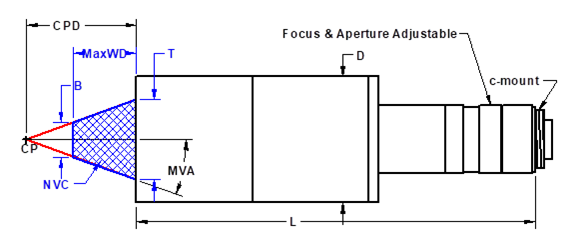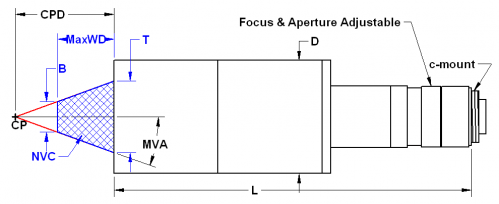PERICENTRIC LENSES
Whether you're inspecting caps, containers, batteries or bolts, Hyper-Eye gives you a unique perspective. See everything with one camera.
When used in normal mode, Hyper-Eye hypercentric/pericentric lenses provide a converging view, as if aimed at a single point called the Convergence Point (CP). The volume that can actually be well-imaged is contained within an imaginary truncated cone called the Near View Cone (NVC). This is the blue hatched region of the diagram. The dimensions of this region are T, B and Max WD.
For standard Hyper-Eye lenses, T ranges from 15.2mm to 25.6mm, B from 35.3mm to 51.2mm, and MaxWD from 28mm to 42mm.
For our High Angle Hyper-Eye hypercentric/pericentric lenses, T ranges from 37mm up to 77.5mm, B from 9.9mm to 21.9mm, and MaxWD from 19.7mm to 53.3mm. Furthermore, the High Angle models have Maximum View Angles (MVA) up to 38 degrees!
As is usual for Light Works, we frequently provide custom solutions, often for only a small premium in terms of time and money. Just ask.
Read more detailed specifications of the Hyper-Eye hypercentric/pericentric lens models.
For our new HA-HE-25nnnn series of compact hypercentric lenses, see here:
Hyper-EyeTM Hypercentric Lens Specifications
For Hyper-Eye lenses, the following general camera format definitions are used. Some manufacturer specifications will vary, so be sure to check out your particular camera. There is no universally accepted standard.
1/4" format: 3.2mm x 2.4mm; 1/3" format: 4.8mm x 3.6mm; 1/2" format: 6.4mm x 4.8mm
2/3" format: 8.53mm x 6.4mm; 1/1.8" format: 7.04mm x 5.28mm

When used in normal mode, Hyper-Eye hypercentric lenses provide a converging view, as if aimed at a single point called the Convergence Point (CP). The distance to this point is called the Convergence Point Distance (CPD).
The volume that can actually be well-imaged is contained within an imaginary truncated cone called the Near View Cone (NVC). This is the blue hatched region of the diagram. The dimensions of this region are T, B and Max WD. These will vary for different lens models.
An additional parameter of Hyper-Eye lenses is the Maximum View Angle (MVA). This is just the largest angle of the NVC. Rays of light from an object are collected over a broad range of angles, up to the limit of the MVA. Outside this angle, nothing is imaged.
The rays of light collected from an object are imaged at the detector. Larger ray angles correspond to larger image radii. This correspondence or Angle to Image Mapping (AIM) varies with the lens model. For detailed AIM data contact us.
| HYPER-EYE (standard; white light) | ||||
| Model | HE-5008 | HE-5012 | HE-7508 | HE-7512 |
| L(Length) | 179mm | 178mm | 267mm | 268mm |
| D(Max. Diameter) | 55.9mm | 55.9mm | 81.3mm | 81.3mm |
| CPD | 49mm | 49mm | 84.5mm | 84.5mm |
| T | 35.3mm | 38.4mm | 51.2mm | 51.2mm |
| B | 15.2mm | 16.5mm | 25.6mm | 25.6mm |
| MaxWD* | 28mm | 28mm | 42mm | 42mm |
| MVA | 21 deg. | 21.5 deg. | 17 deg. | 17 deg. |
| Image radius @ MVA | 1.57mm (1/3" camera or more) |
2.45mm (1/2" camera or more) |
1.46mm (1/3" camera or more) |
2.18mm (1/2" camera or more) |
Hyper-EyeTM High-Angle Lenses
Our High Angle Hyper-Eye lenses offer just that – higher Maximum View Angles (MVA) for those applications requiring increased perspective, up to 38 degrees! These special lenses are designed for use with monochrome light only; white light will result in poor performance. Nevertheless, a given lens may be used with different monochrome sources. For example, one lens may be used with blue, yellow, red, or even near IR light, provided only one source is used at a time. The following specifications are given for 660nm illumination. There will be variations for different wavelengths because CPD varies, but the effects are slight.
| HYPER-EYE (High Angle; monochrome. Specs are for 660nm) | ||
| Model | HA-HE-5008 | HA-HE-5012 |
| L(Length) | 165mm | 165mm |
| D(Max. Diameter) | 55.9mm | 55.9mm |
| CPD | 28.2mm | 28.2mm |
| T | 37.0mm | 37.0mm |
| B | 9.9mm | 11.2mm |
| MaxWD* | 20.7mm | 19.7mm |
| MVA | 33 deg. | 33 deg. |
| Image radius @ MVA | 1.53mm (1/3" camera or more) | 2.3mm (1/2" camera or more) |
| HYPER-EYE (High Angle; monochrome. Specs are for 660nm) | ||||
| Model | HA-HE-7506 | HA-HE-7508 | HA-HE-7512 | HA-HE-10008** |
| L(Length) | 208mm | 208mm | 208mm | 314mm |
| D(Max. Diameter) | 81.3mm | 81.3mm | 81.3mm | 108 to 110mm |
| CPD | 33.8mm | 33.8mm | 33.8mm | 70.6mm |
| T | 53.5mm | 53.5mm | 53.5mm | 77.5mm |
| B | 15.5mm | 18.7mm | 21.9mm | 18.8mm |
| MaxWD* | 23.8mm | 22.0mm | 19.8mm @ F/16 | 53.3mm |
| MVA | 38 deg. | 38 deg. | 38 deg. | 28.5 deg. |
| Image radius @ MVA | 1.53mm (1/3" camera or more) | 2.01mm (1/2" camera or more) | 3.06mm (2/3" camera or more) | 1.55mm (1/3" camera or more) |
* @ F/11 unless otherwise noted
** This very large lens has been optically designed and tested and is available on a built-to-order basis. Estimated lead time is 5 to 6 weeks.

